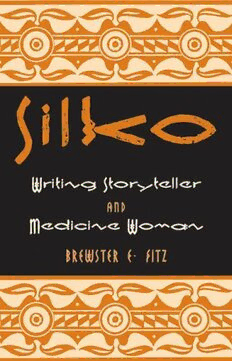
Silko: Writing Storyteller and Medicine Woman PDF
301 Pages·2004·0.868 MB·English
Most books are stored in the elastic cloud where traffic is expensive. For this reason, we have a limit on daily download.
Preview Silko: Writing Storyteller and Medicine Woman
Description:
I suppose that if I didn't have the outlook of a writer, I might get better at storytelling . . . -Leslie Marmon Silko Laguna Pueblo author Leslie Marmon Silko was raised in a culture with a strong oral tradition. She also grew up in a household where books were cherished and reading at the dinner table was not deemed rude, but instead was encouraged. In his examination of Silko's award-winning literature, Brewster E. Fitz explores the complex dynamic between the spoken story and the written word, revealing how it carries over from Silko's upbringing and plays out in her writings. Focusing on critical essays by and interviews with Silko, Fitz argues that Silko's storytelling is informed not so much by oral Laguna culture as by the Marmon family tradition in which writing was internalized long before her birth. In Silko's writings, this conflicted desire between the oral and the written evolves into a yearning for a paradoxical written orality that would conceivably function as a perfect, nonmediated language. The critical focus on orality in Native literature has kept the equally important tradition of Native writing from being honored. By offering close readings of stories from Storyteller and Ceremony, as well as passages from Almanac of the Dead and Gardens in the Dunes, Fitz shows how Silko weaves the oral and the written, the spirit and the flesh, into a new vision of Pueblo culture. As Fitz asserts, Silko's written word, rather than obscuring or destroying her culture's oral tradition, serves instead to sharpen it. Volume 47 in the American Indian Literature and Critical Studies Series
See more
The list of books you might like
Most books are stored in the elastic cloud where traffic is expensive. For this reason, we have a limit on daily download.
